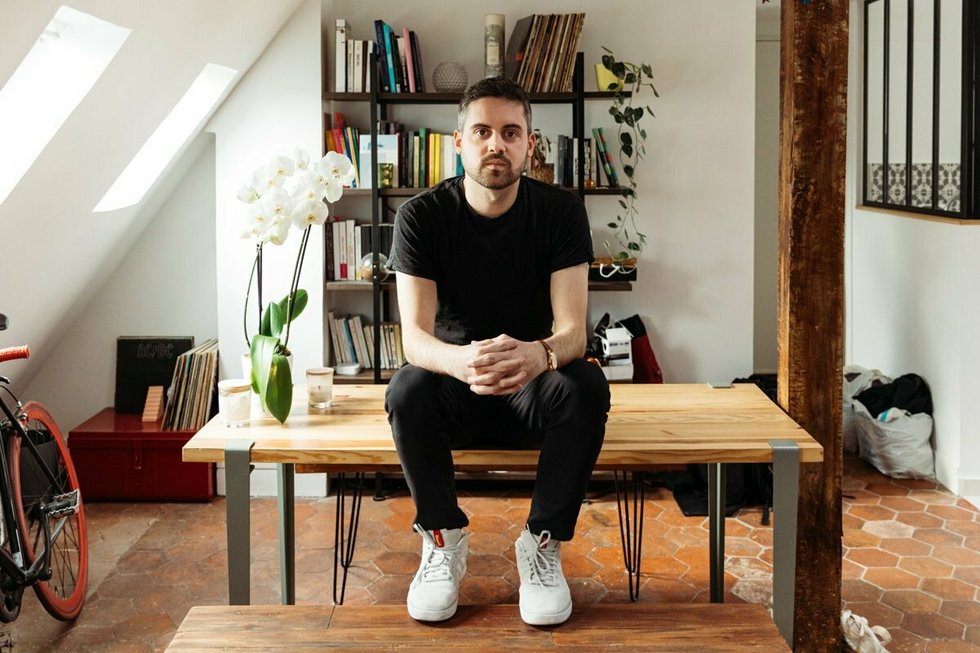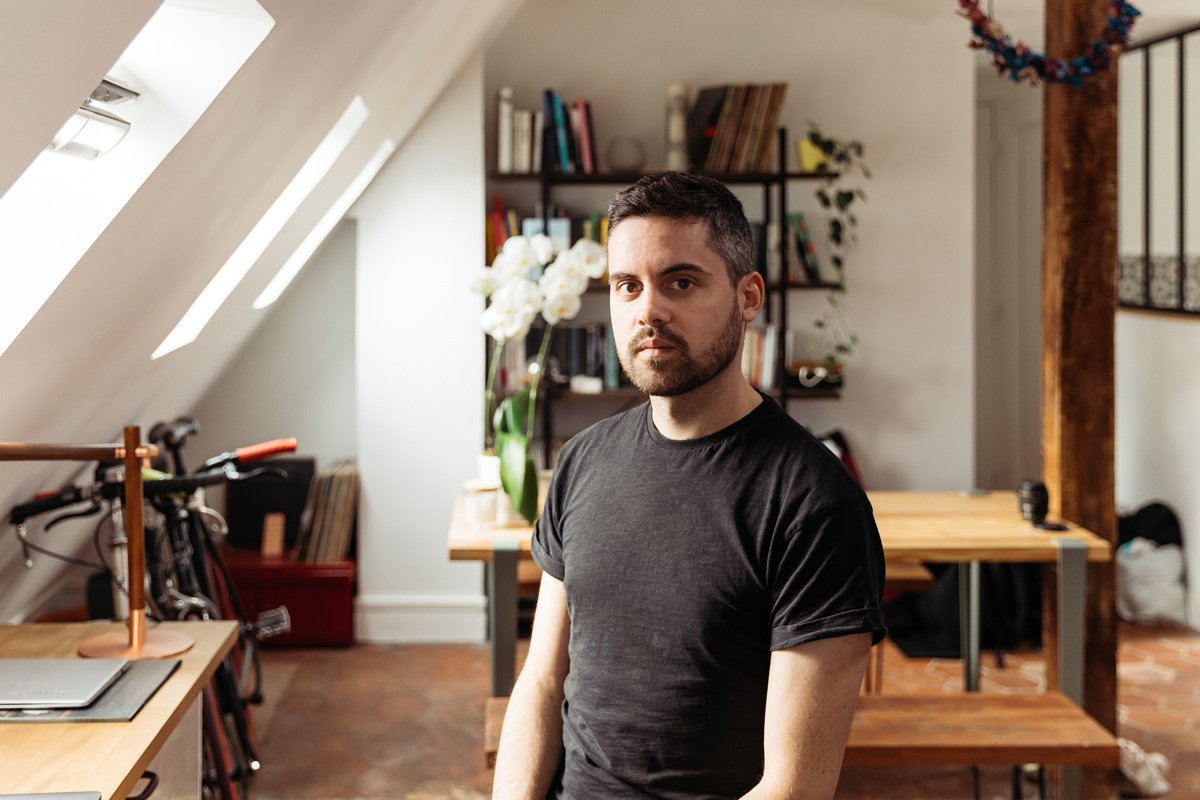Anti-ambition: Why average Joe should be your role model
28 jun 2021
11 min


Photographe chez Welcome to the Jungle

Journaliste - Welcome to the Jungle
Have you been climbing the walls at home from the sheer boredom of lockdown life? Has your life become so stressful it’s turning into a soap opera and it’s making you depressed? Or do you feel guilty about slowing down a little because you’ve been told you must give 110% “for the good of the company”? What if someone told you that being anti-ambition was the answer?
Paul Douard, editor-in-chief of VICE France and author of Je cultive l’anti-ambition (How to Cultivate Anti-Ambition), shares his life philosophy and invites us to let go of our unhealthy obsession with success. His one and only ambition? To be an average Joe.
So, Paul, I feel like we all need to practice being a bit more anti-ambition at the moment. Can you tell us more about your concept?
My definition of “anti-ambition” has evolved over the years, but today it’s mostly about not losing myself in work. I embraced this concept pretty soon after I started working. At the beginning of your career, you’re led to believe you must prove yourself, give everything you have and not mind working long hours. But I did mind. I had no desire to be the best. I had no interest in doing everything my bosses wanted. But that didn’t mean abandoning all my dreams and staying locked in the same job for 25 years with no hope of advancement. It just meant setting certain boundaries for myself, such as not sinking to the level where I’d follow my managers blindly or work myself into the ground. And that’s what I did.
What does anti-ambition look like in terms of behavior?
Early on in my career, I was always the first to leave the office. At 6.01 PM, my desk was empty and that wasn’t always popular. Even now, at VICE, I’ll leave at 4 PM and invite anyone who has no outstanding work to do the same. I don’t think that the amount of work put in automatically guarantees the desired outcome. You just sacrifice more of yourself and take a greater risk. Why go to such lengths when you can simply do your job well and be a nice person? Isn’t that enough? Of course, I wouldn’t tell someone who works in a factory to work “less but better”. I’m aware this logic doesn’t apply to all jobs. But it is compatible with many office jobs. In my case, I got lucky because my very first article for VICE as a freelancer was about anti-ambition. I’d put it out there that I hated work and that got me hired afterward.
Besides time, the ability to say no is also vital. When you say no, it shows you’re in charge of what you need to do, that you’re not going to do just anything. That helps you to remember that if you have too much work or a project seems unreasonable or not feasible, nothing is forcing you to see it through. Many employees would never say no to their manager or colleagues, even though it wouldn’t cost them their job.
“I’m not advocating that people fail so they can learn to “bounce back” better. When you fail, that could simply mean you’re bad at something, it will never change and you should move on.”
So, your philosophy of life basically helps you to maintain a healthy work-life balance?
Anti-ambition does help me to get some perspective: a job is still a job. Most of the time, if you have a task for Friday night but don’t get around to it until Monday morning, no one is going to die. It also helped me to get some perspective on the goals that were set for me, which—I only found out when I became a manager—kind of came from nowhere! They are just carrots to motivate employees, which might be what some people need. But the world won’t stop turning if you don’t get something done for a precise date. It’s not an excuse to do nothing. It just helps to put things into perspective.
It’s funny because, reading your book, you’re kind of like a bull in a china shop. Your writing is very provocative and cynical, but in person, the way you speak is actually quite nuanced.
The thing with this book was, people thought I was the kind of person who just chucked it all in and rejected everything to do with work. But that’s not true. I’ve got colleagues. I want to get along with them. I have four Excel spreadsheets. I use Slack. Sometimes it takes me a bit too long to finish a project—just like everybody else! The main thing is to avoid turning into a psychopath about all that stuff. When I wrote the book, I was just a bit more exasperated. I was sick and tired of my first job in a communications agency. I was 24. I’d just graduated. I was supposed to find a nice job but I ended up at a horrible company. I thought [my career] would be long and difficult.
But today, I think you shouldn’t get upset at the slightest disappointment. If you’re lucky enough to be able to choose where you want to work, you have to make the most of it. But more than anything, put your foot down when you need to, by saying “no”! Unfortunately, not enough people would even dream of doing that. Maybe it’s because they are afraid of getting fired? Well, I don’t think things can be all that bad in the professional sphere. Maybe I have a distorted view of things. Maybe there are idiots at most companies who’d sack you for the slightest infraction. But I’m still convinced it’s not like that. I’ve known both horrible bosses and hateful employees who would do anything to get their bosses fired.
Isn’t it hard being a manager who openly supports being anti-ambition?
I didn’t switch sides when I became editor-in-chief. And since then, I’ve tried to be as honest as possible with the people I work with. First of all, I don’t expect them to work 40 hours a week or answer my messages in 60 seconds. And when I have to get an employee back on track, I don’t set them even higher targets. Instead, I try to have an honest discussion with them about what’s holding them back. Is it about salary, tasks, personal problems, or apathy? No matter what it is, you have to talk about it. I’ve even said to some people: “If you don’t want to work here anymore, you can tell me. It’s not a huge deal. I’m not going to try to fire you.” Because I get where they’re coming from. I went through phases myself when I wasn’t sure I liked my job anymore. It’s only human. Putting more pressure on them won’t help them to see things more clearly or turn the situation around.
“There comes a point where this way of life clashes with an entire system. That’s when you wear your good little employee mask, work a little harder, tell people what they want to hear, and do what is expected of you.”
That said, one thing I find difficult as a manager is getting people to accept that screw-ups happen. Failure has a huge impact on self-esteem, but it shouldn’t affect us so much. If your work isn’t as good as you’d intended, your ego shouldn’t be in tatters. You have to tell yourself there’s still time to accomplish a lot. Sometimes I mess up too. But I’m not bothered.
You’ve said that anti-ambition even helped to protect you from failure. How so? Would you say you lowered your expectations to avoid disappointment?
Yes! I was put under a lot of pressure right from the beginning of school. I was subjected to the common refrain: “If you don’t get good grades, you’ll have to go to a bad college and will end up in a bad job.” But it’s not true. And once again, I’m proof of that. I don’t buy into the whole domino effect anymore. I later realized you make mistakes and it’s no big deal. I’m not encouraging people to rush blindly into a bunch of high-risk projects. But I’m not advocating that people fail so they can learn to “bounce back” better either. I’m more grounded than that. When you fail, that could simply mean you’re bad at something, that will never change and you should move on.
You also make it clear that anti-ambition isn’t meant to be followed literally and that “wearing a mask” is sometimes what you need to do to get through certain points in your career.
Absolutely. There comes a point where this way of life clashes with an entire system. That’s when you wear your good little employee mask, work a little harder, tell people what they want to hear, and do what is expected of you. It might be you’ve got an important exam or your office is understaffed so you must help your colleagues. You can’t just automatically hide behind anti-ambition. No matter how often I told myself I wasn’t bothered about things at school, my tax law courses weren’t going to miraculously etch themselves into my brain. Fortunately, it’s often “just” a matter of sacrificing a few days, and then it’s all over. It’s like a family dinner. You don’t want to be there, but you have to force yourself to smile at Grandma and reassure the rest of your family that your professional future is looking good. It’s just a couple of hours.
“The horrible thing about the concept of meritocracy is that if you succeed, it’s because of all the work you put in, but if you fail, it’s all your fault.”
A job interview is another one of those times when you have to wear a mask. But when you’re conducting an interview, you tell candidates straight off that there’s no need to “lie” and that it’s fine if this job isn’t their dream job. Don’t you think some people are genuinely motivated?
Of course, in interviews, some people are there because they really want the job. Then there are those who apply because they need the money but without any particular interest in the company itself. And that doesn’t mean we can’t work well together! If a candidate tells me that it’s their dream to work for VICE, then that’s great! I get it. But if they say it’s not their dream company or they say nothing at all, that’s cool too. I’m only looking for people who are pleasant and easy to work with. I don’t expect candidates to life for their work. Besides, I also try to be super honest in interviews. I don’t try to persuade people that everything will be perfect every day.
Today you’re the editor-in-chief and you’ve written a book. Yet—as you say—you didn’t have to work hard to get there. You also tell an anecdote about a time at school when you hadn’t revised for an oral exam, but you were upfront about it and your teacher gave you an average grade when you should have failed. What has anti-ambition taught you about meritocracy? Is it still something you believe in?
No, not really. Maybe my teacher liked the way I looked or was in a particularly good mood that day? I don’t know. It was certainly unfair for the people who had worked a lot harder than me but ended up with the same grade. The same goes for my position as editor-in-chief at VICE. There are other people who worked a lot harder than me to get there. It just proves that the way you do things is as important to a company as how much time you put in. When you put them all together, these situations have strengthened my way of thinking, even if it’s caused a lot of misconceptions about and jealousy towards me.
“I don’t even get what “successful” is supposed to mean when you’re an employee. Giving a business your all makes sense if you created it, sure. But employment? That’s still a contract. Why go the extra mile?”
Besides, you have to remember that life involves a certain amount of luck, a bunch of external elements that you can’t control. It’s a message I try to communicate to the people I’m working with. Just being aware of it immediately takes some pressure off you. The horrible thing about the concept of meritocracy is that if you succeed, it’s because of all the work you put in, but if you fail, it’s all your fault. Because no matter how good you are, if you don’t get along with the guy above you, you won’t go very far.
Yeah. Actually, it’s all about storytelling. It’s an excuse to say, “Look, that person went to a top university or business school despite having grown up in a working class environment.” There’s nothing wrong with telling it, on the contrary. But it’s an illusion. These few exceptions aren’t enough to prove that we’re living in a meritocratic system. And, in any case, I don’t think the idea is feasible.
Speaking of success stories, in your book, you seem pretty angry about certain models of success. You have an aversion to people who are “cool” or whose only goal is to own a minivan and a house in the suburbs. Is your issue not with ambition but mostly what it leads to?
Looking back, I wonder if it was a way of protecting myself. When I started writing about anti-ambition, I didn’t tick any of those boxes. But I’ve always enjoyed caricaturing people who fetishise work, who are always “swamped”, “really busy” or “in the middle of a big project”. I always wondered if they were kind of shielding themselves. As if they were trying to convince themselves that their work was so important, it totally justified spending all their time on it. Back then, I was surrounded by way too many people like this and I think it sometimes made me question my philosophy. I would regularly wonder if they might be right. But no.
“Everybody tells you that life doesn’t last forever and it’s your duty to achieve loads and to leave a legacy. But life isn’t a video game. You don’t get a score at the end.”
The funny thing is, the people I know who worked really hard at the start of their career have ended up more like me. And I’ve toned down the anti-ambition a bit, so we’ve finally met in the middle. I think, just like them, after a few years of hard work many employees realize it’s not possible to achieve everything before 30. I’d actually suggest you can ruin your life if you do too much at that age and you can even burn out—all of that just to be “successful”? On top of that, I don’t even get what “successful” is supposed to mean when you’re an employee. Giving a business your all makes sense if you created it, sure. But employment? That’s still a contract. Why go the extra mile?” It’s like negotiating to buy something at a higher price than it is listed on Gumtree.
If there’s one thing running throughout your book, it’s your unabashed support for being “ordinary”. You like being average and staying in what you call “the gray area of slackers”, where you do the bare minimum to get by without standing out or getting noticed.
Absolutely. I realized that’s how I was. And over time, I was perfectly happy to “settle”. It’s great when you can tell yourself, “I’m not necessarily the nicest, most attractive, smartest or richest person, and I’m okay with it.” So, at work, I’m not trying to outdo myself every day. If I’m trying to improve in certain areas, I accept that there are some I’m really bad at and will always be bad at. Being ordinary also lets me be anonymous and go unnoticed, which is something I’ve always enjoyed.
I think we all naturally want to be successful in many areas, as though it makes life “worthwhile”. Everybody tells you that life doesn’t last forever and it’s your duty to achieve loads and to leave a legacy. But life isn’t a video game. You don’t get a score at the end. Not to my knowledge anyway. I’m perfectly content to eat a sandwich while watching TV in the evening. I don’t find that at all depressing. You gain so much when you stop beating yourself up. It’s really cheesy to say it but: you have to live your life. When you hear that, you might say it just sounds like one of those old Facebook sayings, but at the end of the day, it’s true.
Translated by Andrea Schwam
Photo: Welcome to the Jungle
Follow Welcome to the Jungle on Facebook, LinkedIn, and Instagram, and subscribe to our newsletter to get our latest articles every day!

Más inspiración: Carrera

Is a master's degree still worth it?
During a perfect storm of soaring tuition costs, automation and novel ways of online learning, is a master's degree still worthwhile?
23 mar 2023

Contextual intelligence: the skill that allows you to make better decisions
Adapting and understanding change is an important skill to advance your career. Here's how you can improve your decision-making skills.
31 ago 2022

How to prepare for a performance review
Whether you're looking for a promotion or some extra support, solid groundwork and preparation are key to a successful performance review.
02 jun 2022

"I quit!" Three workers share their stories
Quitting can be stressful in life; the uncertainty for what the future holds can be intimidating. Here are three stories ending in liberation.
16 mar 2022

Do you really need to get out of your comfort zone?
With the help of one of our experts, Mackenzie Childs, an organizational psychologist, cognitive behavioral coach and founder of Blink...
08 feb 2022

¿Estás buscando tu próxima oportunidad laboral?
Más de 200.000 candidatos han encontrado trabajo en Welcome to the Jungle
Explorar ofertas


